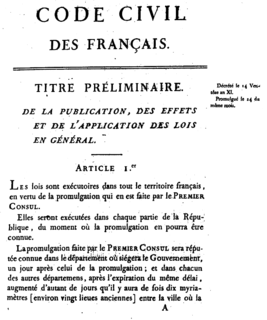
The Napoleonic Code, officially the Civil Code of the French is the French civil code established under the French Consulate in 1804 and still in force, although frequently amended.

Jean-Baptiste Say was a liberal French economist and businessman who argued in favor of competition, free trade and lifting restraints on business. He is best known for Say's law—also known as the law of markets—which he popularized. Scholars disagree on the surprisingly subtle question of whether it was Say who first stated what is now called Say's law. Moreover, he was one of the first economists to study entrepreneurship and conceptualized entrepreneurs as organizers and leaders of the economy.

The University of Paris, metonymically known as the Sorbonne, was the main university in Paris, France, active from 1150 to 1970, with the exception of 1793–1806 under the French Revolution.
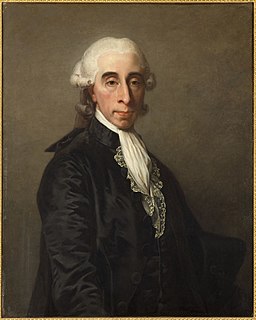
Jean Sylvain Bailly was a French astronomer, mathematician, freemason, and political leader of the early part of the French Revolution. He presided over the Tennis Court Oath, served as the mayor of Paris from 1789 to 1791, and was ultimately guillotined during the Reign of Terror.

Henri-Benjamin Constant de Rebecque, or simply Benjamin Constant, was a Swiss-French political activist and writer on political theory and religion.

Jean Lesage, was a Canadian lawyer and politician from Quebec. He served as the 19th Premier of Quebec from 22 June 1960 to 16 June 1966. Alongside Georges-Émile Lapalme, René Lévesque and others, he is often viewed as the father of the Quiet Revolution. Quebec City International Airport was officially named in his honour on 31 March 1994, and a provincial electoral district, Jean-Lesage, was named for him, as well.

Antoine Quentin Fouquier de Tinville was a French prosecutor during the Revolution and Reign of Terror periods.

Jérôme Pétion de Villeneuve was a French writer and politician who served as the second mayor of Paris, from 1791 to 1792.
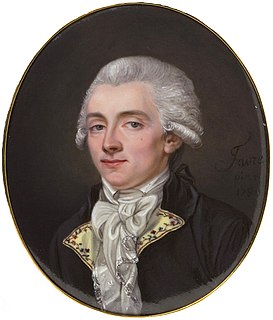
Jean Joseph Mounier was a French politician and judge.
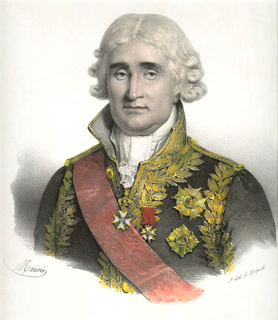
Jean-Jacques-Régis de Cambacérès, Duke of Parma, was a French nobleman, lawyer and statesman during the French Revolution and the First Empire. He is best remembered as one of the authors of the Napoleonic Code, which still forms the basis of French civil law and French-inspired civil law in many countries.

Louis Gabriel Ambroise, Vicomte de Bonald, was a French counter-revolutionary philosopher and politician. Mainly, he is remembered for developing a set of social theories that exercised a powerful influence in shaping the ontological framework from which French sociology would emerge.
The Ultra-royalists were a French political faction from 1815 to 1830 under the Bourbon Restoration. An Ultra was usually a member of the nobility of high society who strongly supported Roman Catholicism as the state and only legal religion of France, the Bourbon monarchy, traditional hierarchy between classes and census suffrage against popular will and the interests of the bourgeoisie and their liberal and democratic tendencies.
The Law of Suspects was a decree passed by the French National Convention on 17 September 1793, during the French Revolution. Some historians consider this decree the start of the Reign of Terror; they argue that the decree marked a significant weakening of individual freedoms that led to "revolutionary paranoia" that swept the nation.
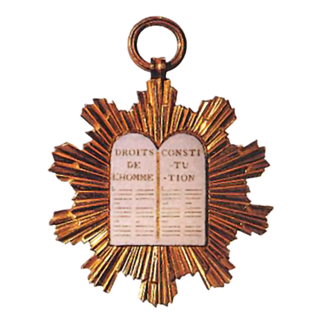
The Legislative Assembly was the legislature of France from 1 October 1791 to 20 September 1792 during the years of the French Revolution. It provided the focus of political debate and revolutionary law-making between the periods of the National Constituent Assembly and of the National Convention.
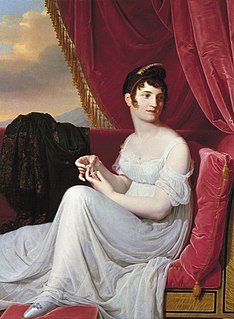
Thérésa Cabarrus, Madame Tallien, was a Spanish-born French noble, salon holder and social figure during the Revolution. Later she became Princess of Chimay.

Forêts[fɔ.ʁɛ] was a department of the French First Republic, and later the First French Empire, in present-day Belgium, Luxembourg, and Germany. Its name, meaning 'forests', comes from the Ardennes forests. It was formed on 24 October 1795, after the Southern Netherlands had been annexed by France on 1 October. Before annexation, the territory was part of the Duchy of Luxembourg and the Duchy of Bouillon. Its capital was Luxembourg City.

The Chouannerie was a royalist uprising or counter-revolution in twelve of the western départements of France, particularly in the provinces of Brittany and Maine, against the First Republic during the French Revolution. It played out in three phases and lasted from spring 1794 to 1800.
Etta Lubina Johanna Palm d'Aelders, also known as the Baroness of Aelders, was a Dutch spy and feminist, outspoken during the French Revolution. She gave the address Discourse on the Injustice of the Laws in Favour of Men, at the Expense of Women to the French National Convention on 30 December 1790 and was a founding member of the first female-only organisation in the history of France, Société patriotique et de bienfaisance des Amies de la Vérité. D'Aelders used these political platforms to instruct French citizens on the struggles of women in the public and private spheres, and to show men the harm that was being caused to the lives of women through their relative social inferiority. D'Aelders joined women like Olympe de Gouges and Théroigne de Méricourt in her resolute determination to improve the rights of women and mobilise tangible action to drive female equality forward.

Jean Lacave-Laplagne was a French magistrate and politician.

Jean-Élie Gautier was a French politician who was briefly Minister of Finance in 1839.
















